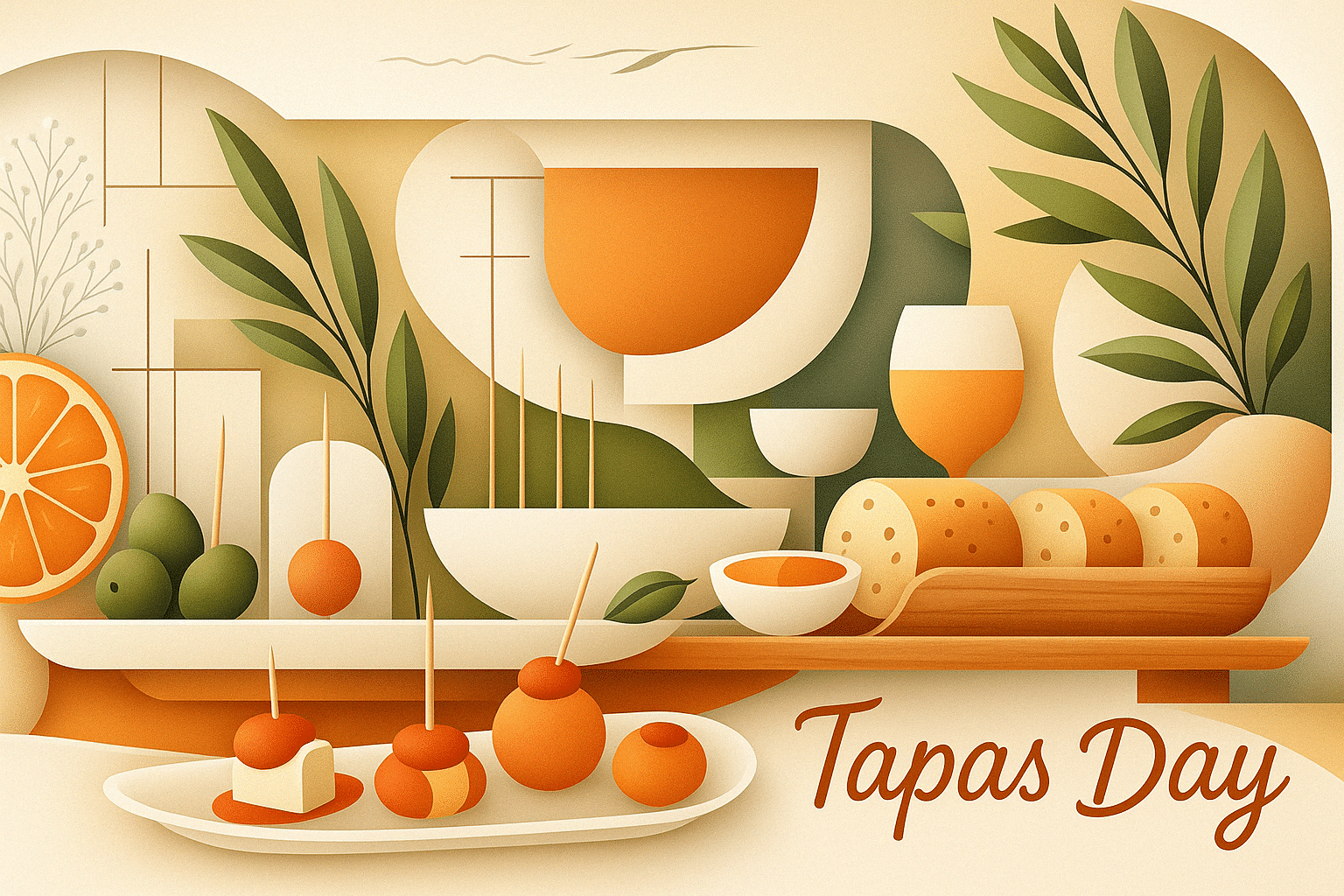What is Tapas Day?
Tapas Day is held every year on the third Thursday of June in Spain (National Tapas Day). The day celebrates the country’s rich culinary tradition of serving small, flavorful dishes known as tapas. These plates are more than snacks. They represent a culture of sharing, conversation, and relaxed dining.
Tapas Day invites people to explore the diversity of Spanish food, from olives and cheese to grilled prawns and spicy potatoes. Whether served in bars or at home, tapas are a symbol of social life in Spain, and this day highlights their cultural and gastronomic value.
In the Netherlands, Tapas Day is embraced by Spanish restaurants and food lovers. Many places offer special tasting menus, while cooking workshops and themed dinners are also popular.
History and Origin
Tapas Day was introduced by Spain’s tourism board as a way to promote Spanish food culture internationally. The date was chosen to fall during summer, a season when people are more likely to enjoy long meals and outdoor gatherings.
The word “tapa” comes from the Spanish word for “lid.” One theory is that slices of bread or ham were once placed over glasses to keep flies out, eventually evolving into a culinary tradition. Over the centuries, tapas became a beloved part of Spanish identity.
Tapas Day now serves as both a local celebration and a global invitation. Spanish embassies, restaurants, and food festivals around the world use the day to introduce new audiences to the variety and creativity of tapas.
Who participates in Tapas Day?
- Restaurants and chefs: Spanish eateries offer tasting menus, workshops, or new tapas creations.
- Food lovers: People enjoy going out for tapas or preparing their own dishes at home.
- Tourism boards: Spanish cultural organisations promote the event as part of national gastronomy campaigns.
- Cooking schools: Classes and demos are held to teach people how to make traditional and modern tapas.
- Retailers and delis: Shops highlight Spanish products such as olive oil, jamón, and manchego cheese.
Slogans and Themes
Tapas Day focuses on variety, flavour, and togetherness. Popular slogans include “Spain in Every Bite,” “Share the Taste,” and “Tapas: More Than a Meal.” Themes often celebrate culinary heritage, regional diversity, and the pleasure of eating in good company. The messages promote both tradition and innovation in Spanish cuisine.
Colors, Symbols and Patterns
Colors
- Red: Represents Spanish passion, and common ingredients like peppers, chorizo, and wine.
- Yellow: Symbolises sunlight, saffron, and the warmth of Spanish hospitality.
- Brown: Reflects rustic elements such as wooden serving boards and earthenware plates.
Symbols
- Small plate: The universal symbol of tapas, used in logos and event designs.
- Toothpick: A typical item in many tapas, often skewering olives or anchovies.
- Wine glass: Represents the pairing of tapas with Spanish wines or sherry.
Patterns
- Tile motifs: Inspired by Andalusian ceramics, often seen in restaurant decor.
- Grape clusters: Used to highlight wine culture alongside tapas traditions.
- Abstract food shapes: Stylised olives, seafood, or bread slices are common in visual branding.
Most used hashtags
- #TapasDay
- #DiaDeLaTapa
- #SpanishFood
- #TapasLovers
- #TasteSpain
How do you celebrate Tapas Day?
- Go on a tapas crawl: Visit multiple restaurants or bars and try a different tapa at each one.
- Host a tapas night: Invite friends over and prepare a variety of small dishes to share.
- Take a cooking class: Learn how to make classic tapas like tortilla española or patatas bravas.
- Pair with Spanish wine: Explore food and drink pairings with sherry, Rioja, or cava.
- Post your plates: Share photos and recipes online to spread the love for Spanish cuisine.
Why is Tapas Day important?
Tapas Day is important because it preserves and promotes one of Spain’s most beloved culinary traditions. Tapas are about more than food. They represent a way of living, where eating is social, unhurried, and full of flavour. This day celebrates those values and encourages people to discover the richness of Spanish culture through its dishes.
It also supports local businesses, tourism, and food education. Whether in a bustling bar in Madrid or a quiet restaurant abroad, Tapas Day brings people together through shared tastes and experiences. It keeps the tradition alive while allowing for creativity and change.
Features
- Food and Drinks
